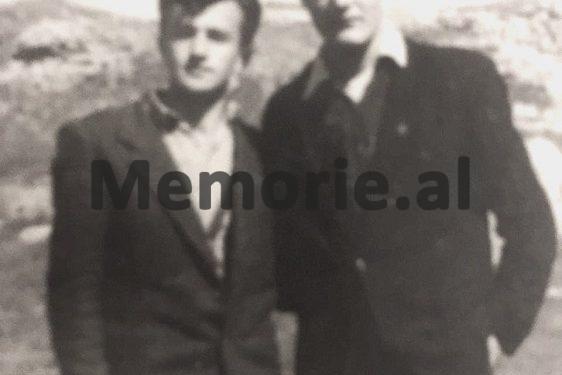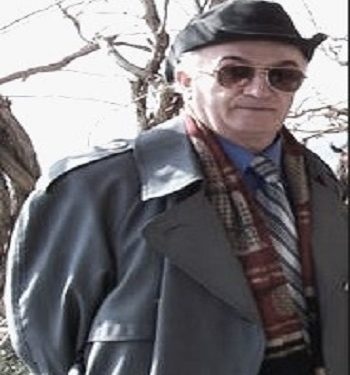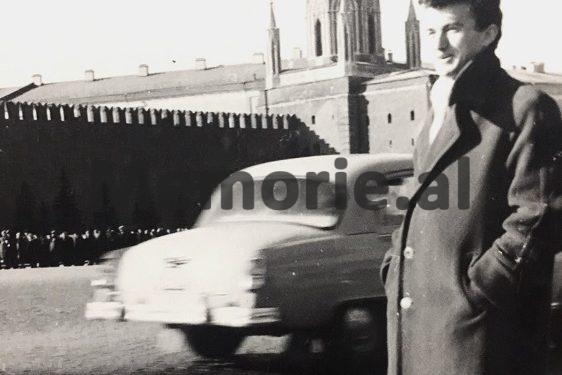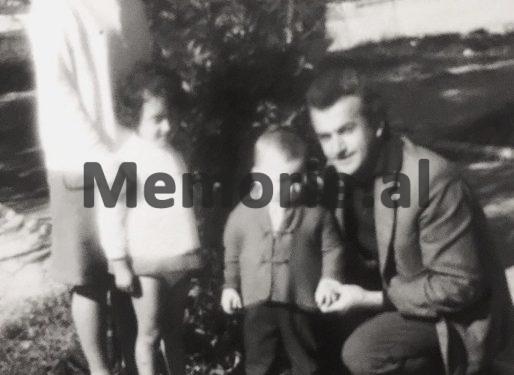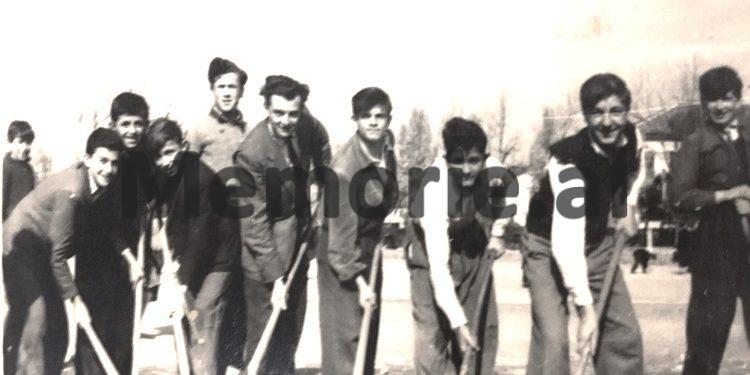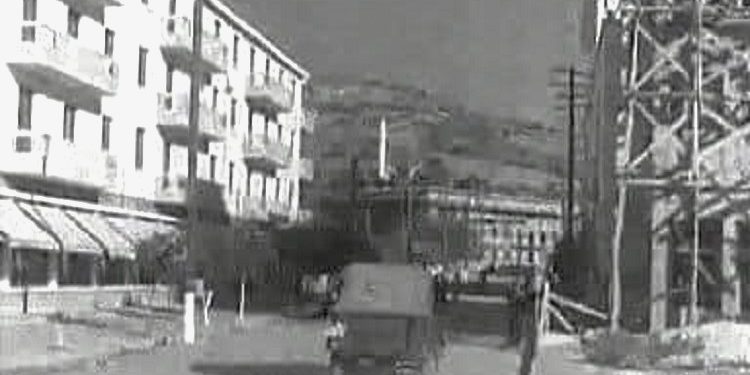From Sokrat Shyti
Part eleven
Memorie.al / The writer Sokrat Shyti is the “great unknown” who, for several years, has revealed the tip of the iceberg of his literary creativity. I say this based on the limited number of his published books in recent years, primarily the voluminous novel “Nata fantazmë” (Tirana 2014). His novels: “PËRTEJ MISTERIT”, “MES TUNDIMIT DHE VORBULLËS”, “GËRRYERJET E MAKTHIT”, “HIJA E TURPIT DHE E VDEKJES”, “KOLONELI KRYEDHJAK”, “SHPRESAT E NËMURA”, “PËSHTJELLIMET E FATIT” I, II, “MBIJETESA NË KASOLLEN E LOPËS”, as well as other works, all novels ranging from 350 to 550 pages, are in manuscript form waiting to be published. The dreams and initial excitement of the young novelist, returning from studies abroad full of energy and love for art and literature, were cut short early on by the brutal edge of communist dictatorship.
Who is Sokrat Shyti?
Having returned from studies at Moscow State University, right after the rupture of Albanian-Soviet relations in 1960, Sokrat Shyti worked at Radio “Diapazon” (which at that time was located on Kavaja Street), in an editorial office with his journalist friends – Vangjel Lezho and Fadil Kokomani – both later arrested and subsequently executed by the communist regime. Besides the radio, Sokrati, at the age of 21, if we may imagine, had passionate literary interests at that time. He wrote his first novel “Madam doktoresha” and was on the verge of publication, but… alas! Right after the arrest of his friends, to fill the cup, a brother of his, a painter, fled abroad.
Sokrat was arrested in September 1963, and in November of that year, he was sent into internment (together with his mother and younger sister) to a location between Ardenica and Kolonje in Lushnja. For 27 consecutive years, the family lived in a livestock shed made of reeds, without windows, while Sokrat was subjected to forced labor. During these 27 years, he was legally obligated to report three times a day to the regional authority. He had no right to move from the place of internment and was deprived of any kind of documentation, etc. In these conditions, among a livestock shed, he gave birth and raised his children. It was precisely from this event, or rather a very long history of persecution, that he was inspired to write the book “Survival in the Livestock Shed”!
Agron Tufa
Continued from the previous issue
EXCERPT FROM THE BOOK, “SURVIVAL IN THE COW SHED”
The three months of this summer passed more quickly and more easily than the anxiety of the beginning, when I took the road home, after the unexpected announcement from the gymnasium director, explaining that I did not need to take the final exams because I had all A’s. Therefore, the decision of the Pedagogical Council should be understood as a gesture of gratitude for fulfilling a duty that belonged to some of the school professors. When I think back on how all the scenes unfolded, from the moment of this unusual announcement until now, as the day of my return to the northern city of study approaches, it seems like a dream.
But what seems even stranger to me is my internal feeling, which still does not accept that my father is not alive among us, and within me, the anxiety revolves as if he has gone somewhere to perform a duty, and after some time he will return! Or he is in a treatment hospital specialized for bronchial asthma, where they have given him full hopes for improvement. Relying on this assumption creates the belief that after a few months, a second notification might reach the gymnasium’s administration, completely different from the first, to inform me that my father’s health is showing signs of recovery, and I should alleviate my bad concern that the illness is worsening.
From this perspective, everything that happened should be accepted as a state of hallucination, the truth has been completely different, except for a few moments when the bronchial asthma tormented him to the point of exhaustion. Because such phenomena can happen to anyone, considering that diseases are companions of human life, integral parts of it, which are overcome with willpower and ongoing intensive treatment. Therefore, just as I learned over these eight years, without the presence of my second brother (whom I loved more than any other brother or sister in the family), convincing myself that he is somewhere, working and living in an unknown place, I will gradually try to detach myself from the imagination of what I saw in the grounds of the Church of Golem, two graves, father and son next to each other, covered with wreaths of flowers.
Perhaps this transformation of my imagining was also created by the relief of my spiritual state: I was glad that my mother had reduced her weeping when she was alone in the room. I also felt satisfied with how she spent her free time, after finishing the housework and cooking, talking in a low voice to the photographs, the only way to fill the emptiness of grief and bring their spirits closer to her. One day she surprised me with her reasoning when I asked her why she looked at the photographs so often:
“Don’t you know yet why man’s mind has invented photography?”… – she replied with a reproachful tone. – “Then I will tell you: to immortalize each person, when they will no longer be physically present. Our ancestors had a hard time leaving something of themselves behind as a memory. Whereas we have the fortune to preserve our likeness. – Humanity always moves forward. Our generation and those to come have the opportunity to preserve voice and movement, just as if they were alive!” – I added.
“Not everyone! – she objected. – This privilege is only for those who roam up and down in cars and live like lords of old. While the poor cannot even fill their bellies with bread, since they remain ignored and despised by society in life, after death, they vanish like salt in water!”
“Perhaps there will come a time when simple people will enjoy at least a bit of these now-prohibited privileges for the poor!” – I replied.
“May your words go to God’s ear, my son!” – she said, making the sign of the cross.
Often, when I returned from work, after we had lunch and both sat down to relax, my mother would frequently start conversations with memories from the years of the War, with the terrible anguish of bread and the distressing poverty that forced the miserable to become foragers and wander like beggars. She mentioned these painful topics deliberately to remind me of my father, how hard he tried to help the impoverished and destitute of the city, by feeding and clothing them!
“He was so devoted to the poor that when we happened to criticize him, my older sister or I, because we both shouldered the burdens, your father would give us a stern reprimand,” – she said with a reproachful tone towards herself, to show how high he stood in their regard! – “Especially he made us feel cold water when he decided to shelter, clothe, and feed the wretched Vasil, infested with lice.
For the first time, he used an open threat, since at home he wasn’t in the habit of raising his voice! He did this only to order us to comply with his directives. And he was not satisfied with the first reprimand. When we put the large pot of water over the fire, he commanded in a commanding tone: once he bathes, his clothes must be burned! We were surprised that on that very day, he brought home new clothes, a suit, shoes, socks, and a hat! And he knelt before the icon of Jesus Christ:
‘Blessed be you, oh God of great Mercy, who showed me the bright path of Your Son, how a believer should act to carry out a humane service, to give an abandoned wretch the chance to taste the flavor of satisfaction!’ – he said with tearful eyes, making the sign of the cross. Very rarely can a second person be found, so kind-hearted as your father!” – she emphasized with a sigh.
Every time my mother mentioned my father’s charities to help the city’s poor, my childhood memories would surface, reminding me of his conversations with friends and acquaintances when they were in the store exchanging thoughts with one another. My father would become heated, unable to tolerate the greed and narrow-mindedness of some rich people, who spend their time indulging in orgies in casinos and never think to give the remnants of their feasts to the wretches, just to alleviate a portion of their gnawing hunger, while at the same time, they buy fresh meat and fish in the store for their dogs and cats!
– “Why does God perform magic and not show these fools their place?!” – the angry driver Llambi interjected. – “But it’s not for nothing they say: lightning doesn’t strike in a barn!”
– “And why should God concern Himself with our evils when He has given us minds, eyes, and ears to see our relationships with pain?” – replied my father.
– “The fattened pigs know only gluttony and greed. That’s why the pig deserves a bullet in the forehead, for the swine only bite,” – added driver Llambi. – “Mind and spirit are mutually connected,” – my father explained further.
– “When God knows that a wicked person uses their mind to commit crimes and heinous acts, and there’s no human heart, kills and strikes at will, why does He give this one the fate of the righteous when the opposite should happen?” – Llambi insisted.
– “It’s not God who gives it, but Satan. He feeds his mercenaries with the blood of the poor!”
– “But the state is just watching?!” – the driver was getting heated.
– “Most of the rulers are mercenaries of Satan. That’s why the poor find no support when they knock on the state offices. The main aim of the rulers is to enrich themselves at the expense of the people. Formally, among the rulers, there are deceptive quarrels, just to throw dust in the eyes of the small. In reality, the fights and insults happen to divide the spoils according to the law of the jungle: the strongest gets the lion’s share. While the jackals, even though they bark more than others, rejoice in the scraps!” – my father emphasized in an annoyed tone.
– “They know that we, simple people, make up the fodder for their feast, and no matter how much noise we make and shout, we do not bite. Because the rulers not only possess all our wealth but command our muscles, spirit, and mind! And not just for our generation. From the very beginnings, when the idea of the state was cast as a necessary tool for disciplining the crowds, the thought of plunder was born, enriching the ruling minority at the expense of the subdued majority. Thus, an inseparable symbiosis was formed between the state and the ambitions of the rulers.
Here lies the source of the fierce struggle that takes place among political forces to come to power, using all forms: force, deceit, the buying of votes, subjugation. Therefore, in all social formations of different eras, the symbiosis of the state with the rulers remains unchanged, regardless of the outer appearance that serves as a facade of deception, and sometimes undergoes transformations,” – my father concluded his explanation.
This reasoning rooted itself deeply in my memory, serving as a guiding light and beacon in the most challenging moments of life, helping me to restrain myself in making the right decisions, especially when chance pushes me and throws me into an unknown crossroads. In a way, this reasoning was akin to my mother’s saying, who during one conversation, emphasized something important: “I am glad that in many things you resemble your father: in mind, behavior, and the desire to help others! But I pray to God that you do not have his bitter fate!”
At that time, I did not understand what she meant by “bitter fate.” Primarily the course of health, that terrifying diseases would not gnaw at me from within? Or the course of life, the career after finishing my studies, whether my natural talents would align with the pursuit of a profession, or would I be dismissed by the political caste and the elite of privileged intellectuals, who don the armor of the untouchable authority, make the law, and set the list of the pampered, those who must be kept close to elevate the fame of the “Greats,” beyond their abilities and merits, making the crowd dazed and filling their minds that these belong to the top of the Pyramid, deserving to be supported, backed, and financed by the state of the Dictatorship of the Proletariat, since no one else knows better how to weave praises and panegyrics for Communism and the Almighty Zeus?”
“I could not answer the second question, as I had just begun to detach myself from living with my parental family, so the course of my future could not be predicted. My success depended solely on my academic performance and the exercise of my innate abilities. The rest, the most critical aspects, would be determined by the unknowns.
This is what my mother had in mind when she said: ‘I pray to God that you do not have the bitter fate of your father!’ Because the totality of the unknowns forms a person’s destiny. Thus, no one knows exactly what awaits them, not even after a minute, as surprises constantly follow us, manifesting in the most bizarre shapes and forms. My father once told me something in the store that dazzled me, to illustrate how intertwined people’s fates are, a true story, not a figment of imagination:
(A powerful ruler was wrecking his brain to find a dim-witted supporter, with courage and mad audacity, to put a stop to the terrifying ambition of a political opponent, who with cunning, was choking him and not allowing him to comfortably milk the state according to his greedy desires. And when he realized he could not outsmart the unyielding charlatan for power, he began searching for a brave dimwit who hated his opponent to death, so much that he would not be sated even by seeing him in hell. One day, completely unexpectedly, he jumped up, shouting: ‘Eureka!’
Without delay, he immediately called his “savior,” who was in exile, to convey the unbelievable good news, saying: “Rejoice in your ministerial chair! I await your swift arrival, all decked out, like a bridegroom!” At first, this fortunate call seemed to the lucky one like an auditory mirage, as if his ears had deceived him, for there was no way that the minister’s position could be delivered so quickly and easily through a phone call, when ambitious people employ numerous interventions and promise staggering sums to sit in this chair. So, he began to ponder where the hammer of the powerful ruler was striking, for what purpose he was being summoned to become a member of his cabinet?!
The fortunate one knew both of them well, the powerful ruler and his rival, and he knew how many teeth and fangs they had in their mouths, even the tiniest details from their family and personal lives, and he knew all their vices and weaknesses, enough to challenge them in the future after firmly planting the stakes in the territory of power. When he thoroughly examined the proposed situation and ensured he would achieve his intended goal, he set off by plane, dressed to the nines, sporting expensive suits, and arrived in a pompous manner. Just as he had hoped, he was received at the airport by the powerful ruler. In fact, this unusual grandeur was reinforced within a few days, astonishing everyone when he was openly handed a blank check and urged to act, with all his flurry of ambition!
The excessive trust of the powerful ruler in him reminded the minister of the tale of the peasant and the frozen snake he found in the road, which, under the persuasion of an inner urge, he took in his arms to warm it with his body, thinking it might come back to life because he needed it for his sinister purposes. But when the serpent’s blood began to flow and it felt its hunger, it gave the simple-minded peasant a stab in the heart as a “reward” for saving it from freezing!
This tale served as a prompt for the minister to plot in his mind a scenario for how to seize power from the “simple-hearted benefactor.” First and foremost, he secretly and stealthily strengthened his financial positions more and more each day, knowing that with their help, he could climb the ranks of power. And he was not satisfied with that alone. The audacity of ambition took him far: to completely eliminate the arrogant pretender, as he could not stand his boastful self-confidence, believing that history from now on would be written, relying on the adventurous deeds of the powerful ruler! Later he would turn against the charlatan opponent, aiming to strike at his most sensitive points, which he had long been aware of, and he firmly believed that one day he would bring him to his knees…)
– “Even though it seems like a fictional tale, in reality, it’s a true event, showing how intertwined people’s fates are…” – my father said at the end of his interesting recounting.
– “But how did the powerful ruler end up?” – I asked, curious.
– “From the moment you indulge yourself and create the belief that you are a leader, when in reality you are an adventurer with power, you blindly throw yourself into the whirlpool of self-destruction, from which you can’t escape. So one day you will surely face the consequences, like the tortoise under the hammer, and you will pay according to the blow!” – my father replied. – “Because the fool’s head is always the wolf’s meal. It is understood that after the treacherous strike from the minister, the former powerful ruler ended up discarded: he was thrown away like trash from politics, left with his finger in his mouth, his castle crumbled to sand! Meanwhile, the former privileged one, thanks to mafia machinations, managed to take the political grouping he had previously scorned into his own hands, so much so that he would not even accept to become a simple member!”
Every time my mother’s saying; “I pray to God that you do not have the bitter fate of your father!” would disturb me, memories of his stories, advice, and precious lessons would come to mind. Then the question would automatically arise: “What common points will my career have with my father’s fate?” Here I would get stuck, as I did not know where to begin the answer for comparison, since, until the age of sixteen, there was a complete lack of information about my father’s childhood and adolescence.
Meanwhile, our childhood, being troubled with many concerns for our fragile age, did not allow us to create intimacy with our parents, especially with our father. Thus, we rarely had the chance to delve into the curious details about them, as they very rarely had free time.
In the penultimate week of August, I told the school director that I would end my duty as the writer of the New Amza, as I needed to prepare for my return to the dormitory. The director congratulated me for my exemplary clean work, as he flipped through the large notebook from beginning to end.
– “It is worth it; you should be pleased to see it, a true document for the ‘Model’ school!” – he expressed his appreciation with open satisfaction. – “Today I will go to the Education section to collect the amount you are owed for two and a half months. Tomorrow around ten o’clock, you can come to sign the receipt and pocket your first earnings.”
This moment will remain in memory as something precious, even after you finish higher studies and are appointed to a job, not only because it is your first salary earned through hard work, but it serves as proof of independence from yourself, that you love your work and are ready to dedicate yourself to it, bearing on your shoulders the heavy burden of responsibility, and being accountable for fulfilling your duty,” – said the director. Memorie.al
Copyright©“Memorie.al”
All rights to this material are exclusively and irrevocably owned by “Memorie.al”, in accordance with Law No. 35/2016 “On Author’s Rights and Related Rights”. It is strictly prohibited to copy, publish, distribute, or transfer this material without the authorization of “Memorie.al”; otherwise, any violator will be held liable under Article 179 of Law 35/2016.




